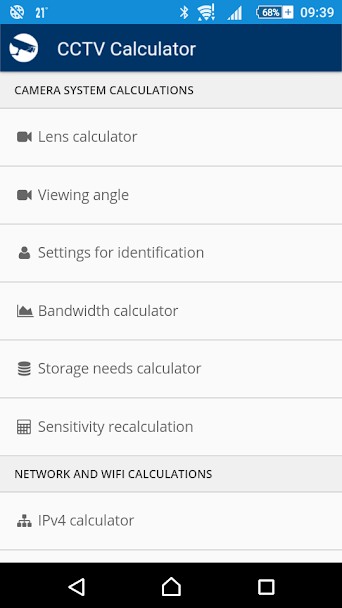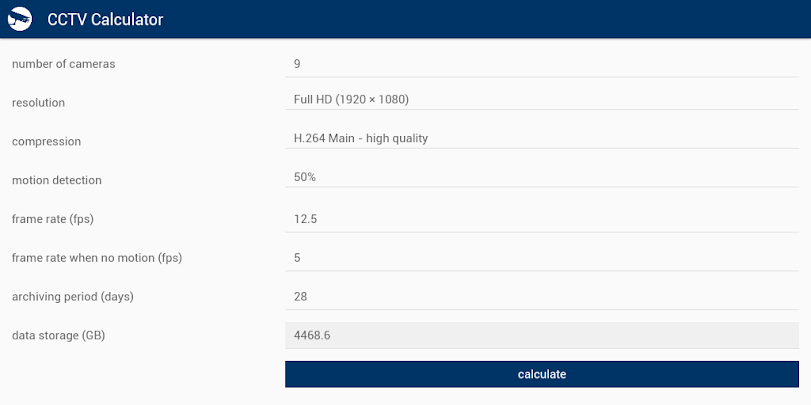The CCTV storage calculator formula is based on the bandwidth of the camera. The recording capacity is mainly up to the record resolution, record stream, and bitrate. Different image quality parameters decide different disk capacity occupations at equal times.
The bigger the record resolution, record stream, and record bitrate are, the more disk capacity is taken up in equal times. You can easily calculate how much capacity you require for a specific amount of time. before learning the CCTV storage calculator formula, first, understand what is bitrate.
I mention below about the Bitrate.
So we are talking about one of the main confusing parts of the CCTV business, which is the CCTV storage calculator formula. When we install the CCTV camera and select the Hard Drive then there is some confusion arises in the mind of the customer as well as the engineer as to how much TB of Hard Drive we should have to install to store the recordings of up to 20 to 30 days.
In modern technology, there are too many advanced CCTV products in the market, some highest megapixel cameras, Codex, NVR, and DVR, etc. To calculate the storage of hard drives we have to understand some factor that affects their means which factor affect storage.
Some factors that affect the CCTV storage calculator formula are below.
- NVR/DVR: Your NVR/DVR working on which codec means which compression that has like H.265, H.2634, or H.265+
- Audio: recording audio also affects the CCTV storage calculator formula means you are recording audio or not.
- Frame rate: When you set an encoding you may see there is compression of the camera showing you are recording the footage on H.264 H.265 or 720p/1080p compression and the framerate is 30, 25, 15, or 10 frames per second. FRAME RATE (It is a group picture, the frame rate is the number of snaps/pictures captured by the camera in one second) By default 30Fps is fixed means there are 30 pics captured by the camera in a second
- Camera: The camera you are using has how many pixels and has analog or HD.
- TVT DVR Online
CCTV Storage Calculator
Below you can find the required capacity of a Hard disk for a CCTV Camera
Simple CCTV Storage Calculator
Bit Rate*
Number of Cameras*
Recording Hours(How many hours cameras run)*
Number of Days you want to record*
TB Required(Hard Disk capacity required in TB )
CCTV Calculator
Here I am also bringing for you the very latest APP that you can install on your Android mobile and can easily calculate the CCTV storage, focal length, etc.
CCTV Calculator is a tool designated for camera system basic parameters determination and testing. It enables easy calculation of an appropriate focal length, camera view, IP camera bandwidth, storage capacity for records archiving, and other camera system parameters.
- In the above image, you can see that there are a lot of parameters that you can calculate using this APP.

- If you have a motion camera then there will be different capacities of the storage you need and in this APP you can also calculate it as the above image shows.

To download the APP Click Here.
Suppose you have 1 TB Hard Drive and 4 Chanel DVR/NVR and you are recording on D1 resolution and the frame rate is 30 Fps recording for 24 hours then you can record/store about 21 days of recordings.
What Is Bitrate?
In simple words, You can say, bitrate is a flow of data. When an image is processed then it takes the signal from a processor in the form of data. The CCTV setup gives you high-quality images, has a high-quality processor, and flows more quantity of data in comparison to other systems. the higher the bit rate of a video, the higher the video quality.
Bitrate is one of the major factors that affect the storage CCTV storage calculator formula if you know about it so only by changing one setting you can calculate the storage capacity. If your camera records 5 megabits per sec bitrate then 5 megabits of data is equal to 500 kilobytes of data each second means half MB of data is recorded in one second roughly.
Ok, let’s calculate for a minute that means the camera will write roughly 30 MB of data, which means for every hour 1.8 GB of data is written. So for one day of the footage is used about 45 GB of the data is. One camera at the rate of 5 megabits per second uses 45 GB of space for one day. If you have 5 cameras then it uses about 225 GB of storage.
Or you have ten cameras then it uses 450 GB storage, then at least 4 terra bytes of Hard Drive should you have to store about 10 days of recordings.
The CCTV storage calculator formula of recording capacity is shown below.
CCTV storage calculator formula
Recording Capacity(MB) = Bitrate(Kbps) ÷1024 ÷8 × 3600 × Recording hours per day ×Record Storage Days × channel numbers.
3600 means record for an hour(1TB=1024GB,1GB=1024MB,1MB=1024KB,1Byte=8bit).
For your understanding, we define a table.

The table below shows the recording capacity requirements for record storage in 30 days.

For instance, there is a 32CH NVR recording 24 hours per day, and the record stores for 30 days. The NVR adopts dual-stream recording. The mainstream is 4096Kbps and the substream is 1024Kbps, then the total recording capacity is 49.45TB (39.56TB + 9.89TB).
Considering the format loss of the disk is about 10%, the required disk capacity will be 55TB (49.45TB ÷(1-10%)). This table is mainly for IP camera setup but using the same formula you can calculate the storage capacity for all kinds of cameras.
Now I am going to tell you about the software which is used for calculating the disc capacity. Any of the cctv camera brands like Hikvision, Dahua, CP Plus, TVT, etc, have software on their website by using which you can calculate the exact number of days recordings to store.
We hope this information about the CCTV storage calculator formula is helpful for you. If you have any queries or suggestions please feel free to write us in the comment box.
THANK YOU.
